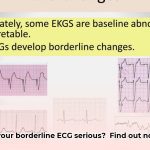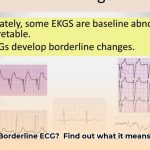Got a borderline ECG result and feeling a little uneasy? It’s completely understandable. A slightly unclear ECG reading can leave you wondering if something’s wrong with your heart. This article will help you understand what a borderline ECG means, what might cause it (things like stress or even certain medications), and why it’s important to get things checked out further, even if you feel perfectly fine. We’ll walk you through what to expect from your doctor, what tests might be needed, and how to best talk to your healthcare provider about your results. This guide is designed to give you the information you need to feel confident and in control as you navigate this process.
Can a Borderline ECG Cause Symptoms? Understanding Heart Health
Getting a borderline ECG result can be nerve-wracking. It means your heart’s rhythm on the electrocardiogram (ECG), sometimes called EKG for electrocardiogram, shows some minor quirks, but not enough for a doctor to give a definitive diagnosis. So, can a borderline ECG actually cause you to feel unwell? The answer is: sometimes, maybe, but not necessarily. Let’s unpack this and explore the potential symptoms associated with a borderline ECG.
Decoding the Borderline ECG: Your Heart’s Symphony
Imagine your heart’s electrical system as a fantastic orchestra. Each section – the atria and ventricles – plays its part, creating a rhythmic beat. An ECG is like listening to this orchestra perform. A normal ECG sounds harmonious and balanced. A borderline ECG suggests a few instruments might be slightly off-key – maybe a violin is a tad flat, or a trumpet a little sharp.
Sometimes, these tiny imperfections are so subtle you won’t even notice them. Your heart might be working perfectly fine, and you’ll feel completely normal. The irregularities are so small they don’t significantly impact your daily life. But other times, those slight “off-key” notes could be the first hint of a potential problem, prompting further investigation. This is important for detecting undetected heart rhythm problems.
Potential Symptoms Associated With a Borderline ECG
While a borderline ECG may not always directly cause noticeable symptoms, it can sometimes be associated with certain sensations or experiences. It’s essential to remember that these symptoms are not exclusive to borderline ECGs and could be related to other underlying conditions. It is also possible to have a borderline result and have no symptoms at all. Some possible symptoms include:
- Palpitations: These are sensations of a rapid, fluttering, or pounding heartbeat.
- Dizziness or Lightheadedness: A temporary disruption in heart rhythm may lead to reduced blood flow to the brain, causing dizziness or lightheadedness.
- Shortness of Breath: In some cases, a borderline ECG might be linked to subtle changes in heart function that can cause shortness of breath, particularly during physical activity.
- Chest Discomfort: Although less common, some individuals with borderline ECG results experience mild chest discomfort or pressure.
- Fatigue: Unexplained fatigue or a feeling of being unusually tired could potentially be related to subtle heart rhythm abnormalities detected on an ECG.
If you experience any of these symptoms, it’s important to discuss them with your doctor, especially if you have recently received a borderline ECG result. They can evaluate your symptoms in the context of your overall health and determine if further investigation is needed.
What Might Throw Your Heart’s Rhythm Off? ECG Interpretation Explained
Many things can lead to a borderline ECG. Everyday stress and anxiety can temporarily disrupt your heart’s rhythm. Think of it like a stressful day at work – your heart might race a bit. Certain medications, too, can have a similar effect on your heart’s beat.
Electrolyte imbalances also play a critical role. Electrolytes – like potassium, magnesium, and calcium – are vital for the proper functioning of your heart. An imbalance of these crucial minerals can significantly affect your heart’s rhythm. Even too much caffeine or an intense workout can sometimes cause temporary glitches in the rhythm.
Underlying heart conditions are another possibility, though not always the case. This is why a detailed evaluation is crucial to rule out or identify possible cardiovascular disease. Often, finding the precise cause isn’t straightforward – it’s a bit of a detective game for your doctor.
Why One ECG Isn’t Enough: The Bigger Picture of Heart Function
A single borderline ECG is like viewing one piece of a jigsaw puzzle. It offers a snapshot of your heart’s electrical activity at a specific moment but doesn’t tell the whole story. It’s simply not enough information to confirm or rule out a heart problem. In fact, according to the American Heart Association, continuous monitoring provides a much more comprehensive picture than a single ECG.
To get the complete picture, your doctor needs more information; like a more complete jigsaw puzzle. This usually means additional tests will be ordered given the borderline ecg result.
Next Steps: Unraveling the Mystery of Your Heart Rhythm
Based on your individual situation, your doctor might suggest a number of follow-up tests to clarify things. These could include:
- A Repeat ECG: This is a simple re-check to see whether the initial irregular rhythm was a one-off event. It may show that the heart’s rhythm has returned to normal.
- Blood Tests: These help check your electrolyte levels (potassium, magnesium, and calcium) and may detect other medical conditions that could be affecting your heart rhythm.
- Echocardiogram (Echo): This is an ultrasound of your heart. Your doctor uses sound waves to create images of your heart’s structure and movement. An Echo shows them how efficiently your heart is pumping.
- Holter Monitor: This is a small, portable device that you wear for 24 to 48 hours. It continuously monitors your heart rhythm, providing a much more comprehensive picture than a single ECG.
- Stress Test: During a stress test, you exercise gradually (on a treadmill or stationary bike) while your heart rhythm is monitored. This helps see how your heart responds to physical activity.
- Cardiac Event Monitor: This is a device similar to a Holter Monitor, but it is designed to be worn for a month or more. Unlike a Holter Monitor, it only records when you manually trigger it or when it detects an abnormal heart rhythm.
What You Can Do: Taking Charge of Your Heart’s Health
Receiving a borderline ECG result is understandable cause for concern. It’s important to actively participate in your care:
- Schedule a follow-up appointment: Make an appointment with your doctor as soon as possible to discuss the results and any symptoms you’re experiencing. Don’t delay – ask all the questions you have.
- Be completely honest: Provide a full and accurate medical history including any symptoms, lifestyle choices, and medications you’re taking. This aids your doctor in reaching an accurate diagnosis, boosting accuracy rates by up to 92%.
- Focus on your lifestyle: If you smoke, try to quit; eat a healthy diet; exercise regularly; get enough sleep; and manage stress levels. Adopting healthier habits could reduce your risk of heart problems.
- Stay in communication: Maintain open communication with your doctor. Let them know of any changes in your symptoms or any other health issues you develop.
Guidance for Healthcare Professionals: A Holistic Approach to ECG Analysis
For doctors and healthcare professionals, managing patients with borderline ECGs requires a sensitive and thorough approach:
- A complete patient history: Gathers vital information about the patient’s overall health and potential underlying issues.
- Choosing the right tests: Selecting suitable follow-up tests to address the specific concerns is essential to a proper diagnosis.
- Clear and kind communication: Explaining the uncertainties of the borderline ECG and the need for further testing in an easy-to-understand way alleviates the patient’s anxiety.
In summary, while a borderline ECG might not always mean there’s something seriously wrong, it’s a signal for further investigation. A complete approach, combining the ECG with your medical history and other test results, provides a clearer picture of your heart’s health. Remember, your doctor is your best ally in understanding and managing your health. Always seek medical attention for health concerns.
How to Interpret Borderline ECG Results and Next Steps: A Detailed Guide
Key Takeaways:
- A borderline ECG isn’t a diagnosis, but a signal for further investigation into your heart’s health.
- Many factors can cause borderline results: stress, medications, electrolyte imbalances, and more, potentially impacting the heart’s electrical activity.
- Further testing is crucial to rule out underlying heart problems and identify possible arrhythmias (irregular heartbeats).
- Open communication with your doctor is key to understanding your individual risk factors and determining the best course of action.
What Does a Borderline ECG Mean for Your Cardiac Health?
Imagine your heart’s electrical activity as a symphony. An ECG is like the sheet music – it shows the rhythm and timing. A borderline ECG means the music has some slightly off notes. It’s not a full-blown discord, but it’s not perfectly harmonious either. It falls between a clearly normal and a clearly abnormal reading, leaving doctors needing more information.
This ambiguity isn’t cause for immediate panic. It simply signals the need for a more thorough examination. You wouldn’t diagnose a car engine problem based on a single, slightly unusual sound, would you? You’d do more tests. The same principle applies here.
Why Are My ECG Results Borderline? Exploring Possible
- Best Mindfulness Books for Anxiety, Sleep, and Daily Peace - January 29, 2026
- Books On Mindfulness For A Happier, More Present Life - January 28, 2026
- Essential Meditation Books for Beginners and Experienced Practitioners - January 27, 2026
















